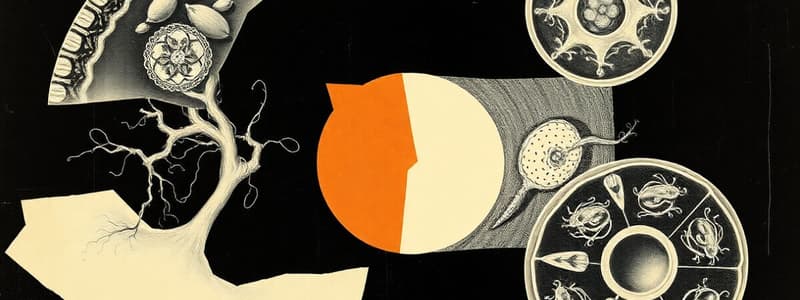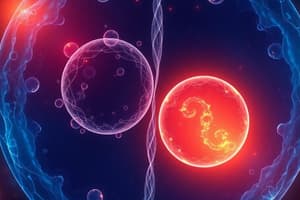Podcast
Questions and Answers
If the parent cell starts out with 24 chromosomes and undergoes mitosis, then how many chromosomes will the daughter cells have?
If the parent cell starts out with 24 chromosomes and undergoes mitosis, then how many chromosomes will the daughter cells have?
24
How many chromatids are present in metaphase of mitosis of a diploid cell having 20 chromosomes?
How many chromatids are present in metaphase of mitosis of a diploid cell having 20 chromosomes?
40
If a gamete contains 8 chromosomes, how many chromosomes will a normal body cell contain?
If a gamete contains 8 chromosomes, how many chromosomes will a normal body cell contain?
16
A cell with a diploid number of 24 undergoes meiosis, how many chromosomes are in each daughter cell?
A cell with a diploid number of 24 undergoes meiosis, how many chromosomes are in each daughter cell?
A sperm cell of a species of insect has 10 chromosomes. What is the diploid chromosome number of this species?
A sperm cell of a species of insect has 10 chromosomes. What is the diploid chromosome number of this species?
A diploid cell in buffalo has 60 chromosomes. How many chromosomes can be expected in a sperm or egg cell in a buffalo?
A diploid cell in buffalo has 60 chromosomes. How many chromosomes can be expected in a sperm or egg cell in a buffalo?
How many chromatids are present in metaphase 1 of meiosis first of a diploid cell having 20 chromosomes?
How many chromatids are present in metaphase 1 of meiosis first of a diploid cell having 20 chromosomes?
How many chromatids are present in metaphase 2 of meiosis second of a diploid cell having 20 chromosomes?
How many chromatids are present in metaphase 2 of meiosis second of a diploid cell having 20 chromosomes?
Two siblings are genetically different from each other and from their parents. These genetic differences are the result of what?
Two siblings are genetically different from each other and from their parents. These genetic differences are the result of what?
Flashcards
Mitosis chromosome number
Mitosis chromosome number
Daughter cells from a mitosis event have the same number of chromosomes as the parent cell.
Mitosis chromatids
Mitosis chromatids
In metaphase of mitosis, a diploid cell with 20 chromosomes has 40 chromatids.
Gamete to body cell chromosomes
Gamete to body cell chromosomes
If a gamete (sex cell) has 8 chromosomes, a normal body cell has 16 chromosomes (2n).
Meiosis chromosome number
Meiosis chromosome number
Signup and view all the flashcards
Diploid chromosome number
Diploid chromosome number
Signup and view all the flashcards
Buffalo chromosome count
Buffalo chromosome count
Signup and view all the flashcards
Meiosis I chromatids
Meiosis I chromatids
Signup and view all the flashcards
Meiosis II chromatids
Meiosis II chromatids
Signup and view all the flashcards
Genetic Variation
Genetic Variation
Signup and view all the flashcards
Study Notes
Mitosis & Meiosis
- Mitosis produces two identical daughter cells.
- Meiosis produces four genetically unique daughter cells.
- Mitosis maintains the chromosome number.
- Meiosis reduces the chromosome number by half.
- Mitosis occurs in somatic cells (body cells).
- Meiosis occurs in germ cells (sex cells).
- Mitosis is for growth and repair. Meiosis is for sexual reproduction.
- In mitosis, parent diploid cells (2n) give rise to two diploid cells (2n)
- In meiosis, parent diploid cells (2n) give rise to four haploid cells (n)
Chromosome Count Examples
- If a parent cell has 24 chromosomes, mitosis will result in daughter cells containing 24 chromosomes.
- If a gamete (sex cell) contains 8 chromosomes, a normal body cell will have 16 chromosomes.
- If a diploid cell has 60 chromosomes, a sperm or egg cell will contain 30 chromosomes.
- A diploid cell with 20 chromosomes will have 40 chromatids in metaphase of mitosis.
- A diploid cell with 20 chromosomes will have 20 chromatids in metaphase I of meiosis.
- A diploid cell with 20 chromosomes will have 20 chromatids in metaphase II of meiosis.
Genetic Variation
- Siblings are genetically different due to crossing over and random assortment during meiosis.
Studying That Suits You
Use AI to generate personalized quizzes and flashcards to suit your learning preferences.





